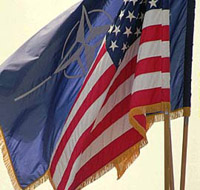NATO’s ongoing expansion destroys the post-war organization of Europe
One of the main topics for debate this year is the possibility that Georgia and the Ukraine may join NATO. The chance that the decision on their entry into the North Atlantic Alliance may be taken in November 2006 at the summit at Riga cannot be excluded. However, Europe’s post-war organization may finally be buried even without the entry of CIS countries into NATO. The reason for this lies in the possible acceptance into the alliance of two European countries that have until now remained neutral – Finland and Austria.

Finland : Has the fear of Russia disappeared?
Finland has remained a neutral country for many years. After the war, it not only found the strength to maintain its independence but even managed not to become a socialist country. In return for this, it was obliged to abstain from joining NATO. For many years, the politics of the Finnish government were based on the principle that it was best not to annoy their neighboring super-power, the USSR. In the end, demilitarized Finland even suited Moscow.
However, after the USSR ceased to exist, radical voices gradually became more vocal every year. Those who came from the Karelsky Peninsula, which had become part of Russia, began to demand that Russia return their territory and reproached the Finnish government for their passivity. Many politicians saw the possibility of entering NATO as the greatest opportunity for achieving this aim.
The topic of NATO has been one of the most important in the presidential elections, which took place this year. Whilst the current president of the country, Tarja Halonen, limited herself to talking of increasing collaboration with the North Atlantic Alliance, her rival, Sauli Niinisto openly defended the acceptance of the country into NATO in the near future. “The president needs to spend less energy supporting anti-globalists and more defending the interests of Finland ”, argued Niinisto.
Even more cutting was the declaration of Yurky Kaitanen, the leader of the right-wing opposition. “Russia still holds an antiquated way of thinking. They want to be a super-power again and their thinking is immersed in this aim. We want to join NATO in order to consolidate our security and strengthen our international influence”, he affirmed. According to most Finnish newspapers, the question of Finland being accepted into NATO has been practically decided. “Over the course of over four decades, Finland has had an agreement with Russia consisting of friendship, collaboration, mutual help and so on. Now, Finland’sunion with NATO is a question of changing sides, or finally consolidating a change that has already occurred”, summarized the newspaper “Ilta Sanomat”.
Finland’s entry into NATO will not represent a significant increase in military potential for the alliance, since their army is relatively small. But the border between Russia and Finland is around 1300 km long and English and American sub-divisions could spread out along the perimeter. In this way, NATO’s troops could be within 200 km of St. Petersburg, not only from the South-West, but also from the North-West.
Austria in NATO: the End of Europe’s Post-war Organization
Unlike with Finland, which has in part limited itself voluntarily to membership to military unions, Austria’s situation is different. In 1955, the USSR, USA, Great Britain and France signed a treaty, according to which Austria was not required to be divided as Germany was. However, two obligations were imposed on Austria – they were forbidden to join Germany and were obliged to maintain permanent military neutrality. These two points formed the basis of the post-war organization of Europe.
However, in recent years, circumstances have changed. In 1995, Austria joined the European Union, and the current Federal Councilor, Wolfgang Schussel, interpreted this as the end of neutrality. Between 1999 and 2004, Austria’s former socialist neighbors joined NATO, and in Vienna, the opinion that Austria’s government should also go in this direction has become stronger and stronger. “In modern-day circumstances, Austria’s neutrality has become an archaic concept and one that does not correspond to the current world situation. It is important to analyze carefully the various possible routes for Austria to take in its entry into the North Atlantic Block”, emphasized Schussel.
From a purely military viewpoint, Austria’s NATO membership does not constitute a supersensitive issue for Russia since the two countries have no common borders. More significant will be the political consequences. The end of Vienna’s neutrality will signify the final burial of Europe’s post-war organization. This neutrality was also decreed in the Helsinky Treaty of 1975 on firm boundaries. Using the Austrian precedent, Finland will be able to demand the return of the Karelsky Peninsula completely officially, and Germany will be able to claim back the Kaliningrad region. In any case, the Helsinki agreement is essentially losing its power…
Vadim Trukhachev
Pravda.Ru
Translated by Leila Wilmers
Subscribe to Pravda.Ru Telegram channel, Facebook, RSS!


